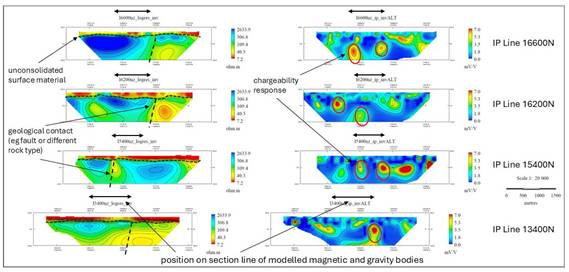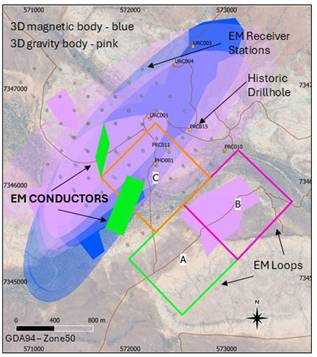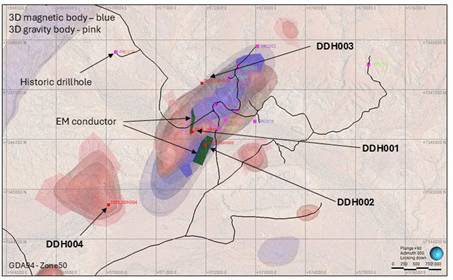| |
|
| 24 July 2025
|
|
| GEO Exploration Limited |
|
| |
|
| ("GEO " or the "Company") |
|
| Juno Project - Results of Electrical Geophysics
Key Highlights:
- Electrical Geophysical programmes completed at Juno Project comprising Induced Polarisation (IP) and Electromagnetics (EM)
- IP and EM responses successfully modelled from subsurface data
- Geophysical responses observed have upgraded the Juno Project from an IRGS perspective
- IP and EM results integrated with existing subsurface models, and proposed maiden drillhole locations confirmed
- Maiden drilling programme scheduled to commence during the current quarter
- Maiden holes will be drilled to depths of between 750m and 1000m and are planned to be vertical
GEO Exploration Limited (LSE AIM: GEO) is pleased to announce that its wholly owned subsidiary Juno Gold Pty Ltd ("Juno Gold") has completed ground based Electrical Geophysical programmes at the Juno Project. The Juno Project is located in central Western Australia where the company is conducting exploration for large Intrusion Related Gold Systems ("IRGS") which host precious and base metal mineralisation.
The Electrical Geophysical programmes comprised Induced Polarisation ("IP") and Electromagnetics ("EM") and was carried out over the northern parts of the project area.
Dipole-Dipole IP was carried out to detect subsurface electrically chargeable and electrically resistive bodies at depth. IRGS type mineralisation can demonstrate a chargeable or resistive response relative to host rock and IP can be used as a direct detection method enabling more robust drill targeting. The survey was acquired using a dipole-dipole array with 200m receiver and 400m transmitter dipole with 200m station locations. Four lines of data were collected for a total of 15 line kilometres.
Data was recorded with two 16 channel SmartTEM receivers and a 50KVa Search Exploration high power transmitter. All field data was subject to an intensive QA/QC review prior to modelling. It was found that ground conditions were challenging for chargeability due to near surface conductivity although reasonable repeatability at depth was achieved.
Resistivity data obtained showed excellent repeatability. Following QA/QC the IP data was processed using inverse and forward modelling techniques.
Results of modelling of IP data were highly encouraging. Resistivity models revealed geological features associated with the eastern and western margins of the 3D magnetic and gravity models over several kilometres of strike. Chargeability models displayed several attractive responses, again, located adjacent to the margins of the 3D modelled magnetic and gravity models over several kilometres of strike (Figures 1 and 2).
Figure 1 - Dipole-Dipole IP 2D Section Lines. Resistivity (left) showing geological contacts and Conductivity (right) showing chargeability responses. Associated with eastern and western margins of magnetic and gravity bodies.
Figure 2 - Dipole-Dipole IP 2D Section Lines on modelled 3D magnetic and gravity bodies. Resistivity (left) and Chargeability (right). 3D model bodies from RNS dated 28 May 2025.
The Company also completed a programme of fixed loop EM at the Juno Project. The EM method allows detection of electrically conductive bodies at depth and provides for spatial modelling of the location of those bodies. The fixed loop EM method, rather than moving loop, was used to increase crew productivity. In total three fixed loops were collected for 14.4 line kilometres of data, using 800m x 800m transmitter loops with 200m spaced receiver lines and 200m receiver station spacings. Data was collected using a DTRX high power transmitter and SmartTEM receiver with a 3 component EMIT B-Field antenna. Data was subject to QA/QC review and found response from early-time channels was subject to surface conductivity, as per the IP data, but good repeatability was achieved for the late-time EM channels of interest. EM data was processed using forward modelling techniques.
Results of EM data forward modelling were positive, outlining two conductive bodies spatially associated with the 3D modelled magnetic and gravity bodies (Figure 3). These conductive bodies or 'Plates' lie spatially adjacent to, or along strike with, the IP chargeability response (Figure 4). Figure 3 - Fixed Loop EM Conductors with modelled 3D magnetic and gravity bodies. 3D model bodies from RNS dated 28 May 2025.
Figure 4 - Fixed Loop EM Conductors, IP resistivity (left) / conductivity (right) sections, with modelled 3D magnetic and gravity bodies. 3D model bodies from RNS dated 28 May 2025.
The geophysical responses observed are consistent with an intrusive body causing the magnetic and gravity responses. This has upgraded the project from an IRGS perspective. The IP and EM responses occur on the contact margins of the interpreted intrusive which is consistent with an IRGS system whereby sulphide mineralisation may develop on the margins of the intrusive due to redox reactions with metasediments and structural controls that may focus metal bearing fluids.
Four diamond drillholes (Figure 5) have been designed to test the best parts of the Juno target based on spatially accurate geophysical models derived from integrated gravity, magnetics, IP and EM data. These drillholes will test the more favourable parts of the magnetic and gravity bodies that have been modelled with a high degree of confidence, and the contact margins of the interpreted intrusive that shows positive IP and EM responses.
These maiden holes for the Company at the Juno Project will be drilled to depths of between 750m and 1000m and are planned to be vertical. Commencement of drilling is scheduled for the current quarter.
Figure 5 - Modelled 3D magnetic and gravity bodies with Fixed Loop EM conductors and proposed diamond drillhole locations. 3D model bodies from RNS dated 28 May 2025.
Callum Baxter, GEO's joint venture partner commented: "Results of the electrical geophysical work are pleasing and have enhanced the Juno Project from an IRGS perspective. We have a high degree of confidence in our spatial modelling and have selected several drillholes for our maiden drill programme at the very large Juno target. I look forward to commencement of drilling during the current quarter."
Omar Ahmad, CEO of Geo Exploration Limited, commented: "We are delighted that the eagerly anticipated maiden drill campaign at the Juno Project is set to commence this quarter. Our JV partner, Mr Callum Baxter, and his world-class team have done an outstanding job expediting the geophysical work over the last 10 months, maintaining the highest standards throughout. This effort has outlined a compelling target several times larger than Havieron was at a comparable stage, underscoring the immense potential of Juno. We are excited, and committed to delivering significant value for our shareholders as we look forward to drilling Juno."
COMPETENT PERSON - The information in this announcement relating to the project is deemed to be a true representation of the exploration results. Mr Steven Andrew Milner has sufficient experience, to qualify as a Competent Person as defined in the 2012 Edition of the Joint Ore Reserves Committee (JORC) "Australasian Code for Reporting of Exploration Results, Mineral Resources and Ore Reserves". Steven is a member of the Australasian Institute of Mining and Metallurgy (M.Aus.lMM #109255), is employed as a consultant with Austwide Mining Title Management Pty Ltd and is a graduate of Durham University and has over 40 years of experience in exploration and mining in Australia, Zimbabwe and Namibia. Steven is a Director of Mineral Search Pty Ltd.
|
|
|
|
|
| The information contained within this announcement is deemed by the Company to constitute inside information under the UK Market Abuse Regulations ("MAR"). Upon the publication of this announcement via a Regulatory Information Service ("RIS"), this inside information is now considered to be in the public domain.
|
|
| For further information please visit: www.geoexplorationlimited.com or contact:
|
|
| GEO Exploration Limited Hamza Choudhry, CFO and Executive Director
|
investors@geoexpltd.com |
| SPARK Advisory Partners Limited (Nominated Adviser) Andrew Emmott, Jade Bayat
|
+44 (0) 20 3368 3555 |
| CMC Markets (Joint Broker) Douglas Crippen |
+44 (0) 20 3003 8632 |
|
SI Capital Limited (Joint Broker) Nick Emerson
|
+44 (0) 14 8341 3500 |
| Follow us on social media
|
|
|
|
|
| This announcement has been issued by and is the sole responsibility of the Company. |
|
RNS may use your IP address to confirm compliance with the terms and conditions, to analyse how you engage with the information contained in this communication, and to share such analysis on an anonymised basis with others as part of our commercial services. For further information about how RNS and the London Stock Exchange use the personal data you provide us, please see our Privacy Policy.






